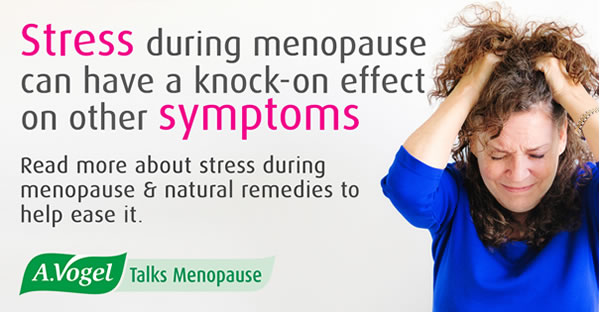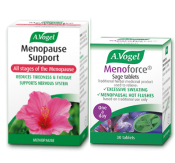An introduction to stress and menopause
Everyone has experienced the feeling of being stressed at some point in their life, even if only for a brief moment. However, among some menopausal women, stress can be a prominent experience. It is a feeling of being under too much pressure, often both emotionally and physically.
Stress is the result of your body’s reaction to a specific situation. Two people can go through the same experience – one might find the position stressful and the other perfectly reasonable and comfortable.

Stress can affect the way you act and think. It can also lead to sleep problems, headaches, difficulty concentrating or difficulty acting rationally.
Why does menopause cause stress?
Your body produces cortisol to allow you to cope with stress. However, consistently high levels of cortisol can be damaging to your body. This is why prolonged stress is not good for your health.
The hormone oestrogen helps maintain the level of cortisol in the body.
As you go through the menopause, the levels of oestrogen begin to drop. This means you are unable to regulate cortisol levels in your body as effectively as before, causing you to experience stress more readily.
Can stress bring on an early menopause?
There is ongoing research around this topic. Generally it is thought that continual high levels of stress can cause you to experience menopause-like symptoms, but this does not actually induce menopause.
The reason for this is, if the level of cortisol is continually high, this echoes the effect of having little oestrogen in the body to regulate it.
What home remedies are there for stress?
Learning how to tackle your stress is not a luxury but vital for keeping you healthy. Some home remedies take a little time and dedication, but could make all the difference in the long run.
- Meditation, yoga and pilates are all techniques which have been used for years to help de-stress. They can help refocus the mind and keep stress factors at bay
- Make time to pursue activities that you enjoy such as baking or gardening. This will help you to relax, and take your mind off stressful issues
- There have been studies to show that getting out and exercising a little every day is vital for minimising stress. Even measures such as jumping off the bus a stop early and walking the rest of the way could help
- Remember to talk to your family or friends about things that are concerning you. ‘A problem shared is a problem halved’ as they say, and it could prevent your stress levels from soaring
- It is important to get enough sleep. Being deprived of sleep is a notorious cause of irritability and intolerance. Getting a good night’s sleep will mean you are rested and ready to tackle the day ahead.
Read more on how you can help yourself deal with stress.
Are there herbal remedies to help me?
- Stress Relief Daytime – this is a licensed herbal remedy which contains fresh extracts of Valerian and Hops. It has a calming effect on the nervous system
- Passiflora – this is a plant which originates from South America and the East Indies
- Avena sativa - this is an extract of oat straw and has been used as a nerve tonic for hundreds of years. It contains substances such as Gramine and vitamin B, important for the normal function of the nervous system
- Flower Essences – there is a range of Jan de Vries flower essences including Female Essence, Emergency Essence and Relaxation Essence, which are designed to help with the different emotional aspects of the menopause.
What about conventional medicine?
If you find that home and herbal remedies are not effective in calming your stress, then it may be worth seeking medical attention to help with your symptoms.
A doctor will be able to prescribe a treatment such as an anti-depressant or a sedative. Many of these have side-effects so discuss with your doctor which will be most suitable for you. You may have to try several types before finding the one that is right for you.
In addition, HRT has been used as a general treatment for a variety of menopausal symptoms.
Many conventional medicines for anxiety tackle severe symptoms. If you experience panic attacks or frequently feel overwhelmed by anxiety, then it is important to visit your doctor. If you are concerned about your symptoms then seeking medical advice is also sensible.









